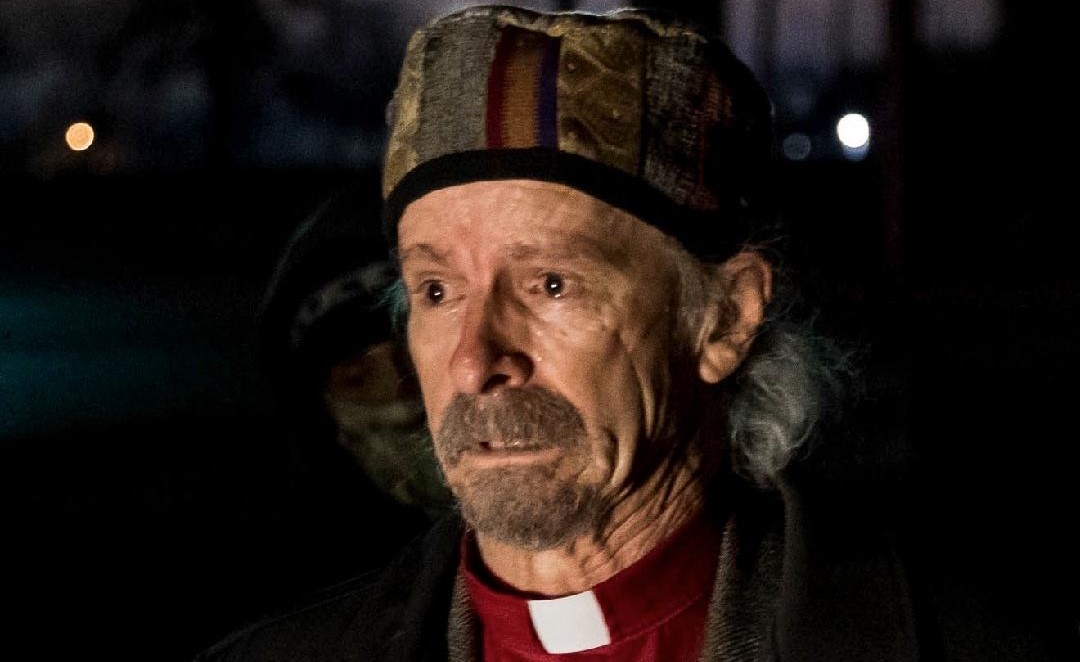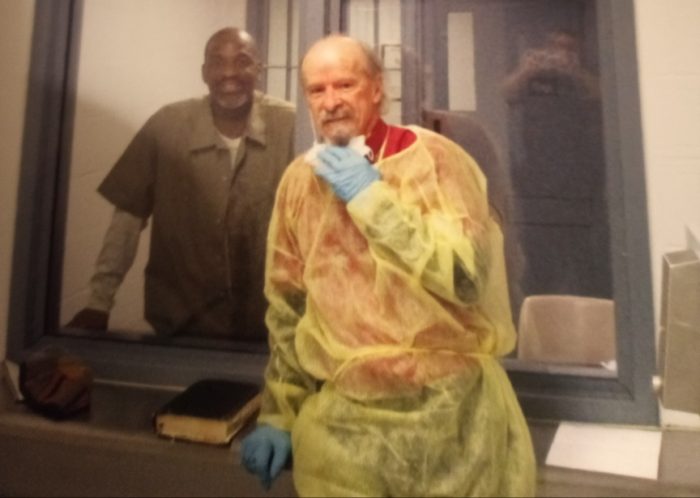‘Cold-blooded, premeditated murder’ – Ian Sinclair talks to BILL BREEDEN

Story by Ian Sinclair, Morning Star, 9 December 2024.
Ian Sinclair talks to BILL BREEDEN, a retired Unitarian Universalist minister living in southern Indiana, and a longstanding opponent of the death penalty in the United States
Now 75 years old, Bill Breeden has served as a spiritual adviser to people on death row since the 1990s. Ian Sinclair asks him about witnessing an execution, the impact the incoming Trump administration will have on the death penalty and the work done by the British organisation LifeLines.
Ian Sinclair: In 2021 you witnessed the execution of Corey Johnson, a prisoner at Terre Haute federal penitentiary in Indiana. Can you give Morning Star readers a sense of your experience?
Bill Breeden: Corey was set to be executed on January 14 2021, just six days before Trump was to exit the White House for the last time, or so we hoped.
Corey had been in solitary confinement for 29 years without a visitor. Corey was mentally challenged and could not read or write. His mother was addicted to heroin and Corey was abandoned at the age of 12. He ended up in a gang, and was involved in a gang war over drug territory in Richmond, Virginia.
Seven persons were killed by Corey and his co-defendant. When I met Corey for the first time, I told him that if he had joined the US army and killed seven Iraqi civilians in Baghdad, I could get him a medal and a commutation. He fought in the wrong war.
I raised funds to bring Corey’s family to visit. There are no rich people on federal death row, and the families of the men cannot afford to travel to Indiana to visit. Corey’s family were able to visit in the last week of his life and then witness his murder by the United States of America.
On the morning of the execution Corey dictated his final words to me because he was afraid that he would not be able to speak. He began his final words with “Do not worry about me, I am at peace. Remember these names…” He listed the names of his victims and said that he was very sorry for the pain he had caused their families. He indicated that he would have told them that many years ago, but he did not know how. He said “I hope you find peace.”

I was taken to the death house in a van driven by the prison chaplain. The warden of the prison would not allow any employee at the prison to enter the death chamber. The killing team is brought in from elsewhere. Their identities are not known.
I was escorted into the death chamber by one of the execution team. It is a small, stark room in a steel building apart from the rest of the prison. When I entered the room, I was told that I could not cross a taped line on the floor that left me standing approximately six feet from Corey.
Corey was strapped to a cross-shaped gurney, able to move only his fingers and toes. He had been in that position for long hours, waiting for all the late appeals to courts to be exhausted.
I spoke to him softly, assuring him of my love for him, and of the love of his family who were in the room off my shoulder. After a while the leader of the execution team told me I could proceed. I started to read Corey’s last words, and was immediately stopped.
“He has to read them!” he barked. I replied the Corey could not read. “He has to read them!” Corey, even if he could have read them, was in no position to hold the paper. I was not allowed to read the words.
I said a prayer, ending with the words of Jesus, “Father forgive them, for they know not what they do.” I’m afraid it did not sit well. The execution team leader stared at me, and we waited again in silence.
I cannot say how long we waited. It seemed an eternity. I occasionally spoke softly to Corey, assuring him that me and his family were with him. Several times a door in the far corner of the room would open and a third member of the team would step in, shake his head in a negative fashion and disappear again. Finally he came in the room and said: “There are no impediments.”
The language of fascism is impeccable. There were no impediments to cold-blooded, premeditated murder.
The team leader stepped to the microphone, and with the voice of a carnival barker shouted: “Let the execution begin!”
The victim’s family members rose, shouting and whistling as if their team had just won the Super Bowl. I don’t blame them. They were set up to do just that. They didn’t get to hear the names of their loved ones and Corey’s repentance.
A man in surgical gowns came in the room, walked around Corey’s prostrate form, and inserted a needle into the line in Corey’s arm. Within a few minutes, Corey’s chest began to heave, he stated that his mouth and hands were on fire. I again said, “I love you brother.”
And then, from the room off my shoulder, Corey’s brother began to shout, “I LOVE YOU BRO! I LOVE YOU BRO! I LOVE YOU BRO!” He continued for however long it took for Corey to die.
I was finally allowed to touch the body of the man I had come to love. I blessed him. Corey had told me that he regretted that he had never accomplished anything in his life.
I have been on this planet over 75 years. Those hours were the worst I have experienced. I hope never to go through it again. With the re-election of Donald Trump, it is likely that I will. I suffer from PTSD symptoms of claustrophobia and occasional sweat-drenched nightmares. I pray for the day when the United States will join the civilised nations of the world and abolish the practice of killing our citizens.
IS: What do you think the impact will be of the incoming Trump administration on the use of the death penalty in the United States?
BB: There are 36 men on federal death row. Twenty-seven of them have exhausted all their appeals. Trump is likely to kill them all unless President Biden commutes all federal death row sentences and denies Trump the thrill of murder. Although the president has no direct power with regard to individual states’ use of the death penalty, the federal government sets the temperature in the room, so to speak. If Trump starts a killing spree, there will be [state] governors who will mimic him.
IS: Given we have had both Democratic and Republican presidents over the last few decades, and none have abolished the death penalty, can you set out what would need to change in the United States for this to happen? In short, what is the political route to abolition?
BB: There is a prophet in the Jewish testament who states that the nation needs a new heart. I believe that heart is coming in the young people of the United States. Every generation is more progressive than the last, and unless Trump is able to generate a fascist movement, I am hopeful that, as the Dalai Lama has predicted, “Women and children will save democracy.” (He didn’t say when).
IS: You visited Britain in October to give a speech at the annual meeting of LifeLines, a non-campaigning British organisation which supports and befriends people on death row in the United States through letter-writing and email. Can you talk about the importance of the work LifeLines does?
BB: LifeLines is well named, because a life line is what they provide. For men and women who are kept in small cells often with windows darkened for years at a time, letters are priceless. I hope more folks will join the Lifelines family, and provide a sense of dignity and belonging to men and women who have been abandoned, stripped of any semblance of worth. A letter is a life line.
